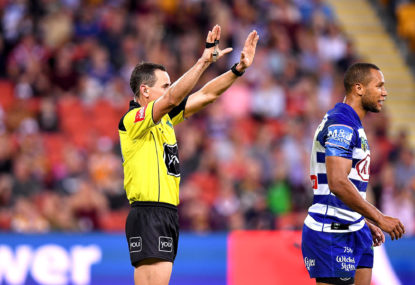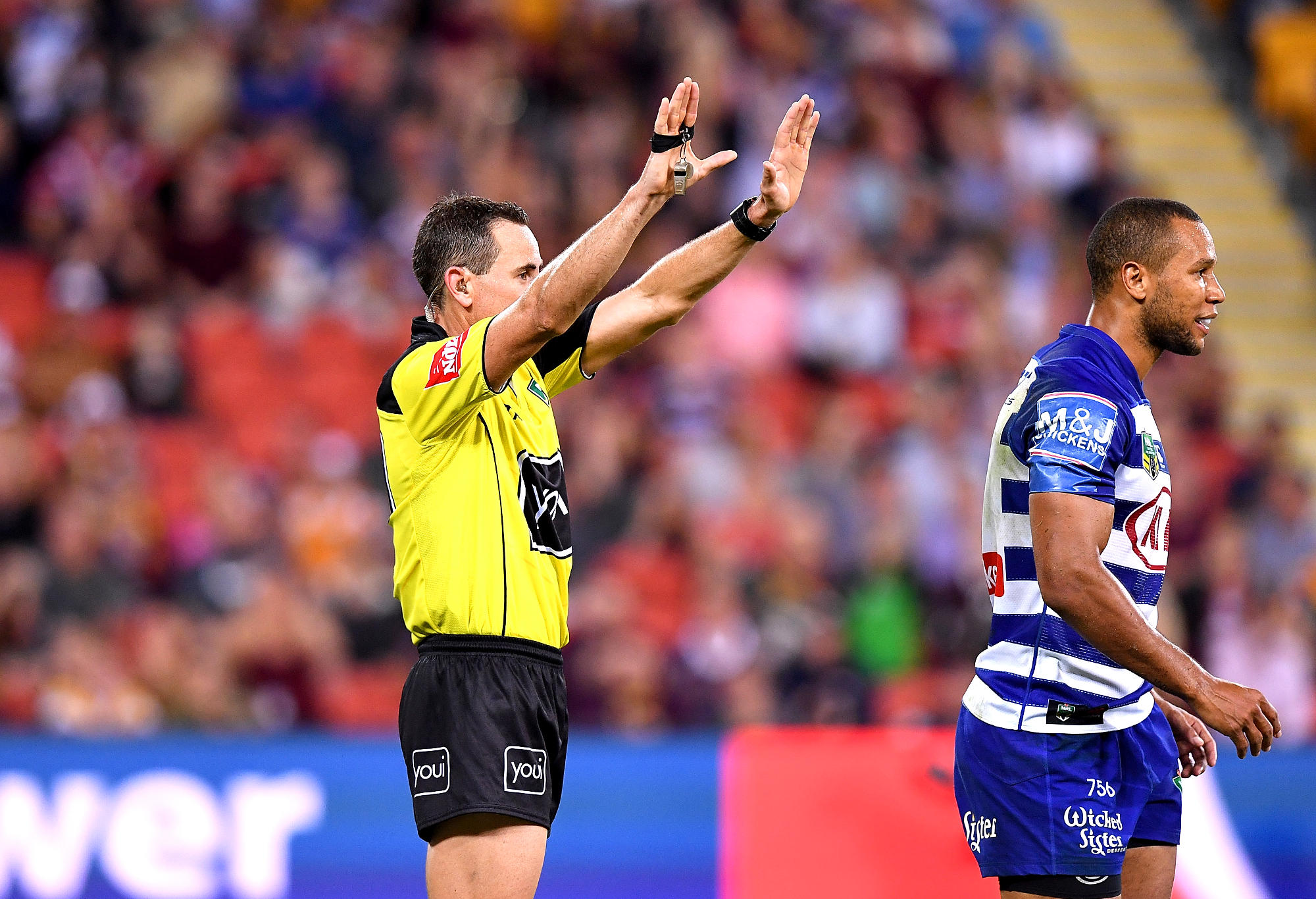NRL Round 7 Team Lists Late Mail: Dolphins get exemption plus Wayne now in doubt, star Rooster out
The Dolphins have again been given permission by the NRL to go outside their top 30 in order to field a team, as coach…

The sin bin was previously one of the most feared weapons at the disposal of match officials.
The whistle would blow and two hands would go up. Supporters watched in agony as their side crumpled to defeat – the ten-minute break had claimed yet another victim.
This year, however, it has been different. Late last year, the NRL Competition Committee urged referees to use the sin bin more.
This year, it has been used 64 times – the overwhelming majority aiming to aid the penalty crackdown that has the rugby league community divided.
NRL CEO Todd Greenberg has come out and said he is “determined to tidy up the game” and while the high penalty counts still remain, there seems to have been an improvement.
However, players are still willing to continually give away penalties on their line. The majority of the teams that do so are the ones that are defensively strong enough to resist constant attacking raids.
Hence, players were continually sent for ten-minute stints on the sideline under the logic that this would deter them from future infringements. Greenberg agreed, saying “it was resolved that ten minutes was still a really strong deterrent.” It makes sense – right?
Well, I mean it should. What team would actually be willing to risk giving the opposition a one-man advantage for ten precious minutes?

Moses Mbye is sin-binned by Matt Cecchin. (Photo by Bradley Kanaris/Getty Images)
The sin bin, however, does not have as much power as it used to have. Teams have adapted, players are smarter, the defence is better. More penalty goals have been kicked to wind the ten-minute clock down. All of which begs the question: is the sin bin really that big a deal anymore?
As a Penrith Panthers fan, I for one am very confident with my side’s defensive structure. After all, they have currently conceded the fewest points in the competition – 190, an average of 14.6 per game. On Friday night, the Panthers had four players backing up from Wednesday night’s State of Origin clash.
Anthony Griffin’s men were flat and quickly found themselves under immense pressure at the hands of a motivated Raiders outfit. Despite several chances on Canberra’s line in the first twenty minutes, the Panthers only held an 8-0 lead. When momentum swung, the Raiders immediately struck back when Nick Cotric barged over out wide.
Shortly after Kaide Ellis was sin-binned for repeat infringements and Canberra fans rejoiced – surely this would only make their job easier. However, so often this year we have seen teams rally together to not only defend their line with just 12 men, but sometimes even go on and score.
A similar thing happened on Friday night. The sin-binning seemed to spark the previously dreary Panthers into action. The Raiders put on a similar play on their left edge with Cotric put one-on-one with Penrith rookie Christian Crichton.
Yet this time, it was Crichton who came out on top, with the 21-year-old sending Cotric flying over the sideline. Penrith only conceded two points with Ellis off the field. They also scored two of their own and went on to win the match.
This was not a rare occurrence, however, with several teams actually gaining an advantage out of the binning of their own player.
| Team | Number of Sin Bins | Average Position of Opposition | Points Conceded | Points Scored | Difference | Win Percentage |
| Dragons | 3 | 9th | 8 (2.7) | 12 (4) | 1.3 | 100% |
| Panthers | 6 | 13th | 16 (2.7) | 23 (3.8) | 1.1 | 83.30% |
| Rabbitohs | 4 | 7th | 16 (4) | 20 (5) | 1 | 75% |
| Warriors | 5 | 7th | 30 (6) | 6 (1.2) | -4.8 | 80% |
| Storm | 3 | 11th | 6 (2) | 12 (4) | 2 | 33.30% |
| Roosters | 6 | 11th | 6 (1) | 8 (1.3) | 0.3 | 83.30% |
| Sharks | 3 | 8th | 8 (2.7) | 18 (6) | 3.3 | 66.70% |
| Broncos | 1 | 6th | 0 (0) | 0 (0) | 0 | 100% |
| Tigers | 6 | 5th | 20 (3.3) | 4 (0.7) | -2.6 | 33.30% |
| Raiders | 3 | 7th | 20 (6.7) | 0 (0) | -6.7 | 33.30% |
| Knights | 3 | 8th | 6 (2) | 0 (0) | -2 | 33.30% |
| Titans | 6 | 6th | 48 (8) | 12 (2) | -6 | 25% |
| Sea Eagles | 5 | 7th | 0 (0) | 12 (2.4) | 2.4 | 40% |
| Cowboys | 1 | 2nd | 12 (12) | 4 (4) | -8 | 100% |
| Bulldogs | 3 | 8th | 2 (0.7) | 7 (2.3) | 1.6 | 33.30% |
| Eels | 6 | 8th | 34 (5.7) | 0 (0) | -5.7 | 0% |
| Team | Opposition Sin Bins | Average Position of Opposition | Points Conceded | Points Scored | Difference | Win Percentage |
| Dragons | 2 | 7th | 0 (0) | 14 (7) | 7 | 50% |
| Panthers | 6 | 13th | 10 (1.7) | 36 (6) | 4.3 | 83.30% |
| Rabbitohs | 4 | 6th | 12 (3.0) | 24 (6) | 3 | 75% |
| Warriors | 5 | 6th | 14 (2.8) | 12 (2.4) | -0.4 | 33.30% |
| Storm | 6 | 11th | 14 (2.3) | 22 (3.7) | 1.4 | 25% |
| Rooster | 4 | 11th | 2 (2.0) | 14 (3.5) | 1.5 | 50% |
| Sharks | 5 | 5th | 14 (2.8) | 20 (4) | 1.2 | 40% |
| Broncos | 3 | 12th | 0 (0) | 14 (4.7) | 4.7 | 100% |
| Tigers | 1 | 2nd | 6 (6.0) | 0 (0) | -6 | 0% |
| Raiders | 4 | 9th | 12 (3.0) | 14 (3.5) | 0.5 | 25% |
| Knights | 5 | 10th | 8 (1.6) | 24 (4.8) | 3.2 | 50% |
| Titans | 4 | 4th | 25 (6.3) | 0 (0) | -6.3 | 0% |
| Sea Eagles | 3 | 11th | 0 (0) | 14 (4.7) | 4.7 | 66.70% |
| Cowboys | 3 | 6th | 15 (5) | 10 (3.3) | -1.7 | 33.30% |
| Bulldogs | 3 | 6th | 0 (0) | 2 (0.7) | 0.7 | 0% |
| Eels | 3 | 8th | 0 (0) | 6 (2) | 2 | 0% |
The Sea Eagles, for instance, have had five players sent for ten-minute spells during 2018 and are yet to concede a point during this time.
In contrast, they have went on to score a combined 12 points. The Dragons, Panthers, Rabbitohs, Storm, Roosters, Sharks and Bulldogs have also performed strongly during this period. Notice that six of those teams are all from the current Top Eight. The Panthers and Rabbitohs may be the most and third-most penalised sides in the competition, yet that has not stopped them from surging towards the top of the ladder.
Eight of the 16 clubs in the league have a winning percentage of over 66 per cent when they have had a player sent for ten during a game. In contrast, just four of the 16 teams have the same winning percentage when given a one-man overlap.

Referee Henry Perenara sends Will Smith of the Eels to the sin bin. (Photo by Mark Kolbe/Getty Images)
Three teams that have paid the price for repeated infringements are the Warriors, Titans and Eels. In the five instances where they have had a player in the bin, Stephen Kearney’s men have only managed to score six points while conceding 30. Unbelievably, they have still gone on to win four of those five games.
The Eels and Titans, however, have collapsed under the pressure of having a player sent to the bin. Parramatta, for instance, are yet to win a game where they have been a man down, conceding 34 points and not scoring a single point.
Similarly, the Gold Coast have only won one of four games where a player was placed in the bin and have let in 48 points during this period. When studying the current ladder, it is no surprise to see both teams ranking in the bottom four when it comes to defence.
Clearly, the better teams in the competition, and in particular the defensively strong ones, have been able to overcome the potential impact of the sin bin.
However, the whole point of increasing the number of sin bins this year was to try discourage teams from the constant infringements that officials are cracking down on.
Sides such as the Panthers and Rabbitohs, who are two of the most penalised teams in the competition, have proven that the very teams that are supposed to be targeted by this change are not deterred.
Instead, they have used their resilience in defence to their advantage. The psychological boost of holding a team scoreless with just 12 men is massive and leaves the opposition frustrated.
The point is that, given what it was it was brought in to achieve, the sin bin is clearly not the most effective way to clean up our game. Taking more extreme action, though, will create even more drama given the anti-refereeing climate that has dominated the headlines this year.
While I wholeheartedly support the current officiating clampdown, I do now wonder how effective it will actually be in bringing about what was initially desired.